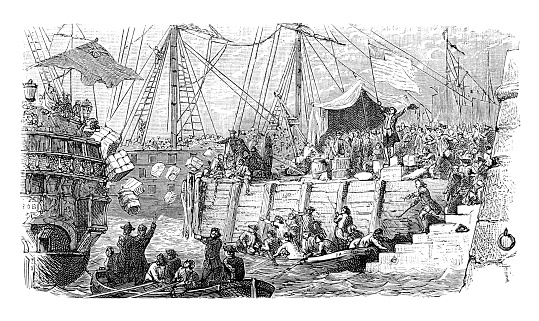-
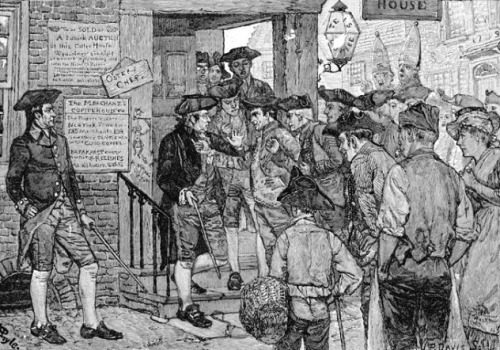
Boston Bread riot
The Boston Bread Riot was the last of a series of three riots by the poor of Boston, Massachusetts, between 1710 and 1713, in response to food shortages and high bread prices. The riot ended with minimal casualties.
-

Dublin election riot
The Dublin election riot occurred during the hotly contested Irish General Election of 1713.
-
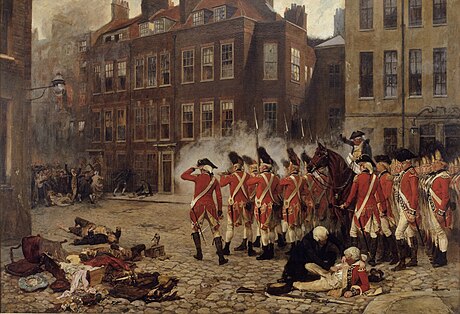
1715 England riots
In the spring and summer of 1715 a series of riots occurred in England in which High Church mobs attacked over forty Dissenting meeting- houses. The rioters also protested against the first Hanoverian king of Britain, George I and his new Whig government (the Whigs were associated with the Dissenters). The riots occurred on symbolic days: 28 May was George I's birthday, 29 May was the anniversary of Charles II's Restoration and 10 June was the birthday of the Jacobite Pretender, James Francis Edward Stuart.
-

Pachtersoproer
The pachtersoproer was a Dutch rebellion in the 18th century. The origin of the uprising was to be found in the economic malaise of the 1740s. It was the system of the rural tax-collection that brought serious complaints, combined with deep dissatisfaction at the way in which the regents and the landed gentry exercised their power.
-

Wager Mutiny
The Wager Mutiny was the mutiny of the crew of the British war ship HMS Wager after she was wrecked on a desolate island off the south coast of Chile in 1741. The ship was part of a squadron commanded by George Anson and bound to attack Spanish interests in the Pacific. Wager lost contact with the squadron while rounding Cape Horn, ran aground, and wrecked on the island in May 1741. The main body of the crew mutinied against Captain David Cheap, abandoned him and his loyal crew members, and returned to England in a modified open boat via the Strait of Magellan. Most of the crew died on the journey, but the mutiny's ring- leaders were among those who survived.
-
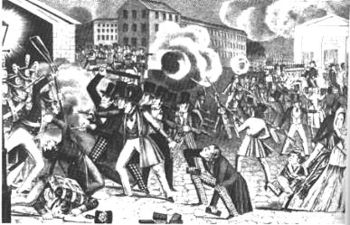
Philadelphia Election riot
The Philadelphia Election Riot in 1742 was a riot that occurred due to political disagreements among the constituents of the increasingly diverse population in the city. Politics in Pennsylvania, including Philadelphia, had long been dominated by the Quakers but, with their political dominance being increasingly threatened by the predominantly Anglican Proprietary party, tensions grew in the city of Brotherly-Love. The Quakers and Anglicans were predominantly led by Isaac Norris II and William Allen, both of whom were well respected and held significant political power. In an attempt to swing the vote, the Proprietary party "hired armed sailors" to disrupt the Quakers who, in their own attempt, were bringing "unnaturalized Germans from the country to vote". On voting day, October 1, 1742, violence broke out between the two sides.
-

Pogrom v České Lípě
Pogrom v České Lípě proti místním Židům vypukl ve městě Česká Lípa dne 9. prosince 1744. Podle dochovaných zpráv došlo k tomu, že během právě probíhající prusko-rakouské války do města dorazily oddíly rakouských pandurů a husarů, které se okamžitě jaly rabovat místní židovskou čtvrť. Při tom se dopouštěly nesčetných brutalit a násilnostní na místních Židech.
-
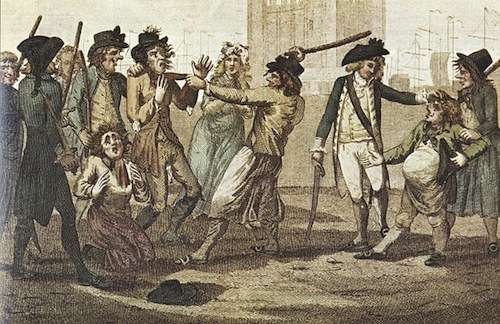
Knowles Riot
The Knowles Riot, also known as the Impressment Riot of 1747, was a three-day riot in Boston that began on 17 November 1747, in response to the impressment of 46 Bostonians by Admiral Charles Knowles into the navy. Hundreds of mostly working- class rioters rampaged through Boston, paralyzed the provincial government, and captured several naval officers and the sheriff's deputy. After Knowles threatened to bombard the town, the British governor of Boston, William Shirley, persuaded him to release the Bostonians in exchange for the hostages.
-

Паўстанне на Каменшчыне
Паўстанне на Каменшчыне 1754—1756 гадоў — буйное ўзброенае выступленне сялян у 50-я гг. XVIII ст. адбылося на паўднёвым усходзе Беларусі, ва ўладанні віленскага капітула Каменшчына (Мазырскі павет). Хваляванні тут пачаліся яшчэ ў 1736 г. і працягваліся з перапынкамі больш за два дзесяцігоддзі. Прычынай іх быў непасільны прыгнёт, які доўгі час трывалі сяляне ад адміністрацыі капітула. У ходзе паўстання узброеныя атрады сялян супроцьстаялі радзівілаўскім жаўнерам і ў рэшце рэшт былі разбіты.
-
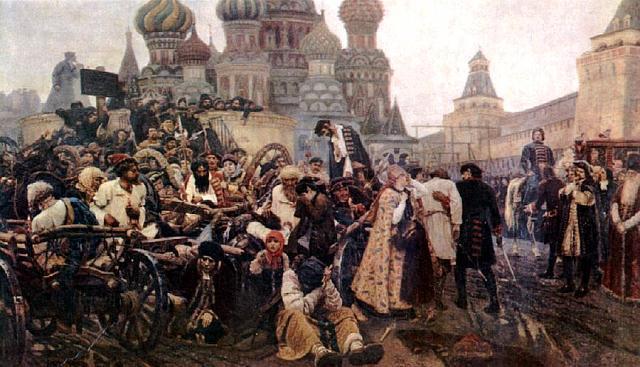
Бахмутская стачка
Ба́хмутская ста́чка — выступление рабочих на государственных соляных промыслах в Бахмуте Новороссийской губернии в 1765 году.
-
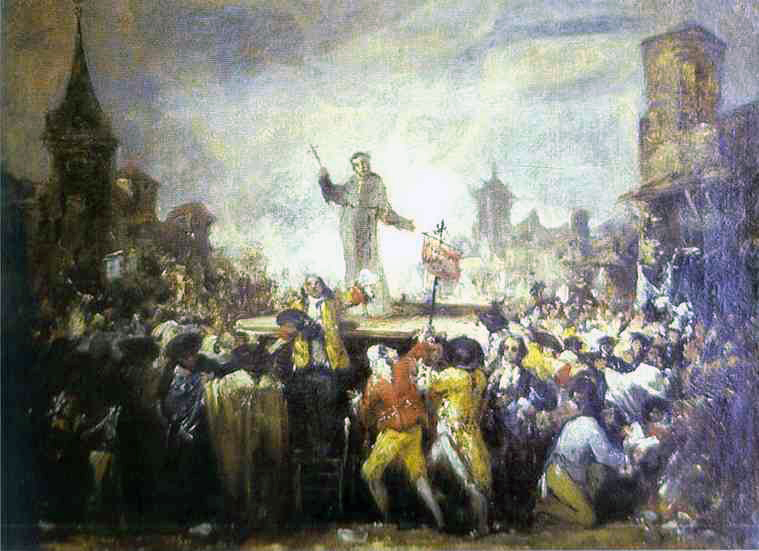
Esquilache Riots
The Esquilache Riots (Motín de Esquilache) occurred in March 1766 during the rule of Charles III of Spain. Caused mostly by the growing discontent in Madrid about the rising costs of bread and other staples, they were sparked off by a series of measures regarding Spaniards' apparel that had been enacted by Leopoldo de Gregorio, Marqués de Esquilache, a Neapolitan minister whom Charles favored.
-

Meermin slave mutiny
The Meermin slave mutiny took place in February 1766 and lasted for three weeks. Meermin was one of the Dutch East India Company's fleet of slave ships. Her final voyage was cut short by the mutiny of her cargo of Malagasy people, who had been sold to Dutch East India Company officials on Madagascar to be used as company slaves in its Cape Colony in southern Africa. During the mutiny half the ship's crew and almost 30 Malagasy lost their lives.
-
Real del Monte 1766 strike
The 1766 Real del Monte strike occurred when silver miners in the province of New Spain went on strike for better working conditions. Real del Monte was a prosperous mining city under the Spanish crown, located in east-central Mexico—-today a municipality in the state of Hidalgo. The mines were owned and controlled by the Count de Regla, Pedro Romero de Terreros from 1735 until Mexican independence from Spain in 1821. He is considered by many to be one of the richest and most powerful Spaniards in the colonies at the time of the strike, and is noted for his incredible business skill in restoring his bankrupt uncle's estate to one of the most prosperous silver producing regions in the whole of Spanish America (Ladd). The strike in 1766 though, in which miners protested changes in labor and wage practices under Terreros, is considered by many to be the first real labor strike in North American history, as it was not only a work stoppage, which had occurred in many places before, but an organized attempt at renegotiating labor contracts and conditions.
-

Butter rebellion
The Butter Rebellion, which took place at Harvard University in 1766, was the first recorded Harvard student protest in what is now the United States. In the decade preceding the American Revolution, economic difficulties made the acquisition of fresh food difficult at Harvard.
-

Prayer protest
Prayer has a long history as a means of protesting injustices, appealing both to God to intervene and enact justice in the situation, and to political opponents to rise to a superior moral position. Boston declared a day of fasting and prayer in September 1768 as a protest against a British plan to station troops in the city. The Colony of Virginia's House of Burgesses established a day of fasting and prayer to take place on Wednesday, June 1, 1774, to protest the Boston Port Act. Thomas Jefferson found this to remarkably effecting, writing that "the effect of the day through the whole colony was like a shock of electricity," moving the Virginians to choose delegates to establish self-rule.
-

Pugachev's Rebellion
Pugachev's Rebellion (Russian: Восстание Пугачёва, Vosstaniye Pugachyova; also called the Peasants' War 1773–75 or Cossack Rebellion) of 1773-75 was the principal revolt in a series of popular rebellions that took place in the Russian Empire after Catherine II seized power in 1762. It began as an organized insurrection of Yaik Cossacks headed by Yemelyan Pugachev, a disaffected ex- lieutenant of the Imperial Russian Army, against a background of profound peasant unrest and war with the Ottoman Empire. After initial success, Pugachev assumed leadership of an alternative government in the name of the assassinated Tsar Peter III and proclaimed an end to serfdom. This organized leadership presented a challenge to the imperial administration of Catherine II.
-
Boston Tea Party
The Boston Tea Party was a political and mercantile protest by the Sons of Liberty in Boston, Massachusetts, on December 16, 1773. The target was the Tea Act of May 10, 1773, which allowed the British East India Company to sell tea from China in American colonies without paying taxes apart from those imposed by the Townshend Acts. American Patriots strongly opposed the taxes in the Townshend Act as a violation of their rights. Demonstrators, some disguised as Native Americans, destroyed an entire shipment of tea sent by the East India Company.
-

Flour War
The Flour War refers to a wave of riots from April to May 1775, in the northern, eastern, and western parts of the Kingdom of France. It followed an increase in grain prices, and subsequently bread prices; bread was an important source of food among the populace. Contributing factors to the riots include poor weather and harvests, and the withholding by police of public grain supplies from the royal stores in 1773-74. This large-scale revolt subsided following wheat price controls imposed by Turgot, Louis XVI's Controller-General of Finances (before the supply recovered), and the deploying of military troops.
-

Gordon Riots
The Gordon Riots of 1780 were several days of rioting in London motivated by anti-Catholic sentiment. They began with a large and orderly protest against the Papists Act of 1778, which was intended to reduce official discrimination against British Catholics enacted by the Popery Act 1698. Lord George Gordon, head of the Protestant Association, argued that the law would enable Catholics to join the British Army and plot treason. The protest led to widespread rioting and looting, including attacks on Newgate Prison and the Bank of England and was the most destructive in the history of London.
-

Aachener Mäkelei
Die so genannte Aachener Mäkelei ist die historische Bezeichnung für eine Zeit massiven politischen Aufruhrs in der Reichsstadt Aachen, die ihren Höhepunkt ab 1786 hatte und erst durch den Einmarsch der Franzosen im Jahre 1792 beendet wurde. Sie ist vergleichbar mit dem Kölner Klüngel und ähnlichen Situationen in mehr als 30 Reichsstädten und beruht auf Absprachen innerhalb der politisch gleichen Interessengruppen sowie gegenseitigen Verleumdungen, Intrigen und Wahlmanipulationen zwischen alteingesessenen, konservativen Ratsmitgliedern, der später so genannten Alten Partei, und den in der Neuen Partei organisierten Reformkräften, die aber letztlich ebenfalls der Aachener Oberschicht entstammten und ähnlich handelten.
-
Paper Money Riot
The Paper Money Riot, or Exeter Rebellion, was an armed uprising in Exeter, New Hampshire, on September 20, 1786. Following the American Revolution, the nation, states, and many individuals were deeply in debt. The lack of specie and paper currency in circulation made the payment of debts difficult for poor farmers. A group calling themselves Regulators called for the printing of paper money, believing that issuing paper notes on credit would help to stimulate the state's economy.
-

Calton weavers strike
The Calton weavers strike of 1787 was the earliest major industrial dispute in Scottish history, when troops fired on demonstrators, killing six. The Calton weavers became Scotland's first working- class martyrs.Ultimately the strike contributed to a workers movement which achieved fundamental changes in the relationship between workforce and employers.The Calton Weavers massacre of 1787 is commemorated in a panel by Scottish artist Ken Currie in the People's Palace, Glasgow, commissioned on the 200th anniversary of the event.
-

Day of the Tiles
The Day of the Tiles (French: Journée des Tuiles) was an event that took place in the French town of Grenoble on 7 June in 1788. It was one of the first disturbances which preceded the French Revolution, and is credited by a few historians as its start.
-

1788 doctors' riot
The doctors' riot was an incident that occurred in April 1788 in New York City, where the illegal procurement of corpses from the graves of the recently deceased caused a mass expression of discontent from poorer New Yorkers that was directed primarily at physicians and medical students.
-
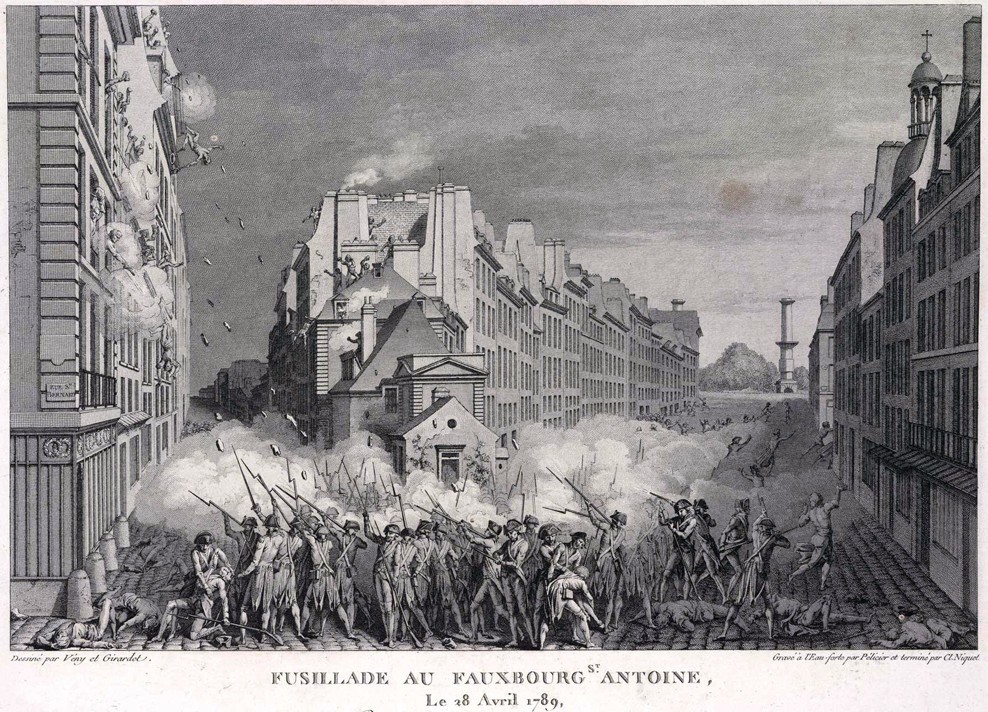
Réveillon riots
The Réveillon riots between 26–29 April centered in the St. Antoine district of Paris where a factory which produced luxury wallpaper was owned by Jean-Baptiste Réveillon. The factory employed around 300 people. The riots were one of the first instances of violence during the French Revolution. The factory where the riot took place was unusual in pre-revolutionary France as the factory was guild-free in an era where guilds controlled quality standards.
-

Rebomboris del pa
Los Rebomboris del pa (en catalán quiere decir «alborotos del pan») fueron unas revueltas populares que tuvieron lugar en Barcelona en 1789, causadas por el aumento del precio del pan a causa de unas malas cosechas.
-

Mutiny on the Bounty
The mutiny on the Royal Navy vessel HMS Bounty occurred in the south Pacific on 28 April 1789. Disaffected crewmen, led by Acting Lieutenant Fletcher Christian, seized control of the ship from their captain, Lieutenant William Bligh, and set him and 18 loyalists adrift in the ship's open launch. The mutineers variously settled on Tahiti or on Pitcairn Island. Bligh meanwhile completed a voyage of more than 3,500 nautical miles (6,500 km; 4,000 mi) in the launch to reach safety, and began the process of bringing the mutineers to justice.
-

Storming of the Bastille
The Storming of the Bastille (French: Prise de la Bastille [pʁiz də la bastij]) occurred in Paris, France, on the afternoon of 14 July 1789.
-

Nancy affair
The Nancy affair (French: Affaire de Nancy), commonly referred to in English as the Nancy Mutiny, was the crushing of a military mutiny in France on 31 August 1790, two years before the final overthrow of the French monarchy. The mutiny was of particular significance in that it illustrated the degree to which the discipline and reliability of the Royal Army had been undermined by thirteen months of revolutionary turmoil.
-

Saxon Peasants' Revolt
The Saxon Peasants' Revolt (German: Sächsischer Bauernaufstand or kursächsischer Bauernaufstand) of 1790 was a military conflict between the nobility and the peasants. The hot spots of the insurrection were large areas around Dresden, Leipzig and Zwickau.
-

Priestley Riots
The Priestley Riots (also known as the Birmingham Riots of 1791) took place from 14 July to 17 July 1791 in Birmingham, England; the rioters' main targets were religious dissenters, most notably the politically and theologically controversial Joseph Priestley. Both local and national issues stirred the passions of the rioters, from disagreements over public library book purchases, to controversies over Dissenters' attempts to gain full civil rights and their support of the French Revolution.
-

Insurrection of 10 August 1792
The Insurrection of 10 August 1792 was a defining event of the French Revolution, when armed revolutionaries in Paris, increasingly in conflict with the French monarchy, stormed the Tuileries Palace. The conflict led France to abolish the monarchy and establish a republic.
-

Demonstration of 20 June 1792
The Demonstration of 20 June 1792 (French: Journée du 20 juin 1792) was the last peaceful attempt made by the people of Paris to persuade King Louis XVI of France to abandon his current policy and attempt to follow what they believed to be a more empathetic approach to governing. The demonstration occurred during the French Revolution. Its objectives were to convince the government to enforce the Legislative Assembly's rulings, defend France against foreign invasion, and preserve the spirit of the French Constitution of 1791. The demonstrators hoped that the king would withdraw his veto and recall the Girondin ministers.
-
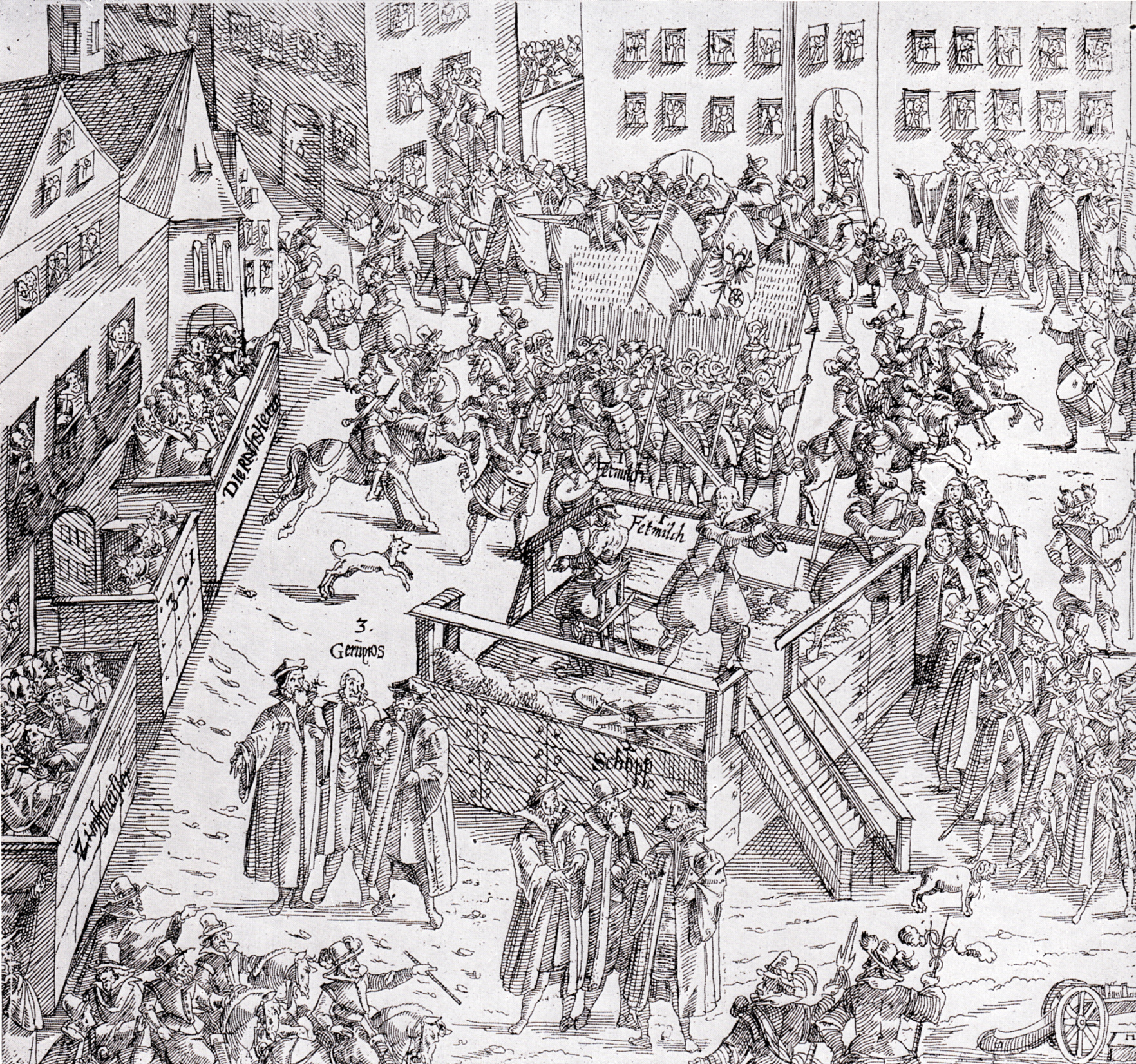
Ebel riot
Ebel riot (Swedish: Ebelska upploppet) was a riot taking place in Stockholm 7 January 1793.
-

Tømrerstrejken i 1794 , den frie encyklopædi
Tømrerstrejken i København som foregik i 1794 er betegnelsen for de begivenheder, der ledte til den første generalstrejke i Danmark.
-
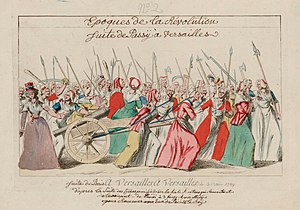
Revolt of the housewives
The revolt of the housewives is a term coined by John Lawrence Hammond and Barbara Hammond for a series of food riots and disturbances in England in 1795 arising out of exceptional food scarcity, in which women played conspicuous roles.
-
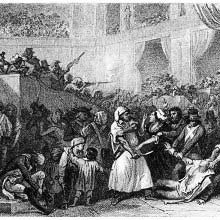
Revolt of 1 Prairial Year III
The insurrection of 1 Prairial Year III was a popular revolt in Paris on 20 May 1795 against the policies of the Thermidorian Convention. It was the last and one of the most remarkable and stubborn popular revolts of the French Revolution. After their defeat in Prairial, the sans-culottes ceased to play any effective part until the next round of revolutions in the early nineteenth century. To a lesser extent, these movements are also important in that they mark the final attempt of the remnants of the Mountain and the Jacobins to recapture their political ascendancy in the Convention and the Paris Sections; this time, though they gave some political direction to the popular movement which arose in the first place in protest against worsening economic conditions, their intervention was timorous and halfhearted and doomed the movement to failure.
-
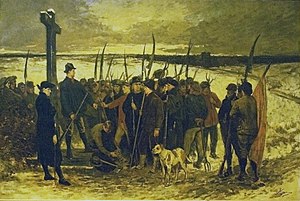
Peasants' War (1798)
Pieter Corbeels Emmanuel Rollier [fr]
